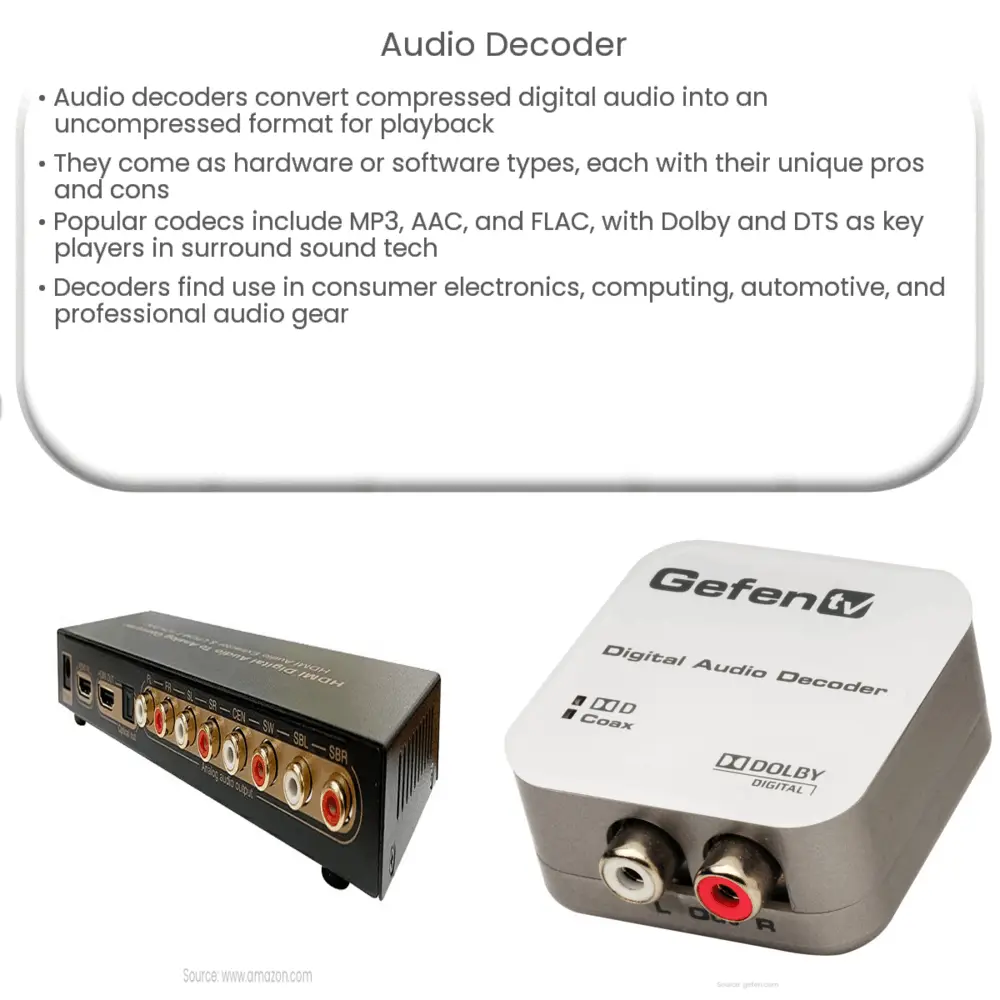An audio decoder converts compressed digital audio data into analog signals, enabling high-quality playback on speakers and headphones.

Understanding Audio Decoders: An In-Depth Look
Introduction
Audio decoders play a critical role in the world of digital audio processing, allowing us to enjoy music, movies, and other forms of multimedia. They convert digital audio data into analog signals that can be processed by speakers or headphones. In this article, we will explore the basics of audio decoders, their types, and their significance in modern audio technology.
What is an Audio Decoder?
An audio decoder is a digital signal processing (DSP) device responsible for converting compressed digital audio data into an uncompressed format that can be played back by speakers or headphones. The process involves decoding the digital data, which may be stored in various formats such as MP3, AAC, or FLAC, and converting it into analog signals. These signals are then amplified and transmitted to the output devices for playback.
Types of Audio Decoders
Audio decoders can be broadly categorized into two types: hardware decoders and software decoders.
Hardware Decoders
Hardware decoders are integrated circuits or standalone devices that perform the decoding process. They are often found in audio equipment, such as home theater systems, soundbars, and portable music players. Hardware decoders can offer superior audio quality and lower latency compared to software decoders, as they are specifically designed for this purpose. However, they can be more expensive and may not support all audio formats.
Software Decoders
Software decoders are programs or applications that run on a computer or mobile device to decode digital audio files. They are often included in media players, such as VLC, Winamp, or iTunes. Software decoders are more flexible than hardware decoders, as they can be easily updated to support new audio formats and codecs. However, the performance of software decoders may vary depending on the processing power of the device they are running on.
Popular Audio Codecs
Various audio codecs are used to compress digital audio data, and different decoders are needed to process these formats. Some of the most popular audio codecs include:
- MP3: One of the most widely used audio formats, MP3 offers a good balance between file size and audio quality. It uses lossy compression, which discards some audio data to reduce the file size.
- AAC: Advanced Audio Coding (AAC) is a successor to MP3 and provides better sound quality at similar bit rates. It is commonly used in Apple devices and streaming platforms like Spotify.
- FLAC: Free Lossless Audio Codec (FLAC) is a lossless compression format that retains all audio data, providing high-fidelity sound quality. FLAC files are larger than MP3 or AAC files but offer superior audio quality.
Dolby and DTS Audio Decoders
When discussing audio decoders, it’s essential to mention Dolby and DTS, two major players in the surround sound technology domain. Both companies have developed proprietary audio codecs and decoding technologies for high-quality multi-channel audio experiences in movies, games, and music. Some of their notable codecs and decoders include:
- Dolby Digital (AC-3): A widely adopted multi-channel audio codec used in DVDs, Blu-rays, and streaming platforms. It supports up to 5.1 surround sound channels.
- Dolby Atmos: An advanced object-based audio format that enables more immersive and precise surround sound experiences by adding height channels to the traditional surround sound setup.
- DTS-HD Master Audio: A high-definition lossless audio codec that supports up to 7.1 surround sound channels, providing excellent sound quality for Blu-ray and digital streaming platforms.
- DTS:X: Similar to Dolby Atmos, DTS:X is an object-based audio format that offers a more immersive and flexible surround sound experience by eliminating the need for specific speaker configurations.
Applications of Audio Decoders
Audio decoders find applications in various devices and industries. Some of their common applications include:
- Consumer Electronics: Audio decoders are integrated into home theater systems, soundbars, televisions, portable music players, and gaming consoles to provide high-quality audio playback.
- Computers and Mobile Devices: Software-based audio decoders are used in media players and operating systems for decoding digital audio files on computers, smartphones, and tablets.
- Automotive: Modern vehicles often incorporate audio decoders to enhance the in-car entertainment experience by supporting various audio formats and surround sound technologies.
- Professional Audio Equipment: Audio decoders are employed in mixing consoles, digital audio workstations (DAWs), and other professional audio equipment for processing high-resolution audio files and multi-channel audio content.
Conclusion
Audio decoders play an essential role in the digital audio landscape by enabling the conversion of compressed digital audio data into analog signals that can be played back by speakers or headphones. With advancements in audio codecs and surround sound technologies, audio decoders continue to evolve, offering improved sound quality and immersive audio experiences across various applications and devices. Understanding the basics of audio decoders and their significance can help users make informed decisions when selecting audio equipment and software for their needs.

